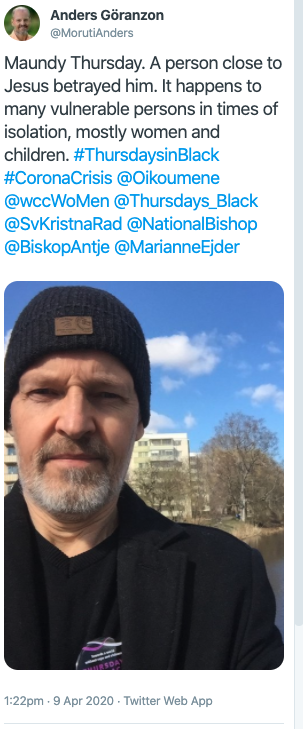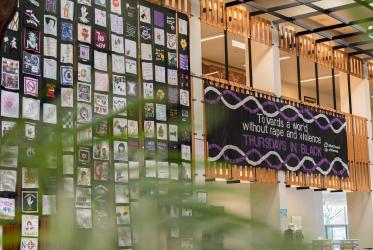Thursdays in Black ambassadors and supporters are calling on us all to protect women who, due to the COVID-19 pandemic, are in situations that make them vulnerable to violence.
In many countries, the rise of domestic abuse is being called “a new COVID-19 crisis” as movement restrictions aimed to stop the spread of the coronavirus is making violence in homes more frequent, more severe and more dangerous.
In Spain, the emergency number for domestic violence received 18 percent more calls in the first two weeks of lockdown than in the same period a month earlier. French police reported a nationwide spike of about 30 percent in domestic violence. Domestic violence reports in the UK are up by 20 percent. In the US, Rhode Island state police reported domestic violence calls had jumped by 36 percent.
Women also comprise 70 percent of frontline healthcare workforce across the globe, lacking protective gear despite their increased risk of exposure.
Ambassadors speak out
Ambassadors of Thursdays in Black, the global campaign for a world free from rape and violence, spoke out on Maundy Thursday to bring attention to an increasingly dire situation for millions of women across the world.
On social media, through poems and posts, comments and statements, they provided emotional support, advocacy and practical help.
The World Federation of Methodist and Uniting Church Women, led by president Alison Judd, posted: "We are told to stay at home and stay safe. But for some that feels impossible. Some women, some children, men even, face another risk during this pandemic. They fear the person who lives with them.”
Rev. Dr Anders Göranzon, general secretary of the Swedish Bible Society, reflected: “A person close to Jesus betrayed him. It happens to many vulnerable persons in times of isolation, mostly women and children.”
Rev. Dr Chris Ferguson, general secretary of the World Communion of Reformed Churches, noted: "Women continue to be the majority of the most exposed caregivers and low wage workers.” He called for a “faith imperative”: “the new normal must be a world without violence against women.”
Rev. Damon Mkandawire, hospital administrator for the United Church of Zambia’s Mbereshi Mission Hospital, said: “Women who are displaced, refugees, and living in conflict-affected areas are particularly vulnerable.”
The Rev. Susan Johnson, national bishop of the Evangelical Lutheran Church in Canada, and the Evangelical Lutheran Churches in America led by Bishop Elizabeth Eaton, have posted across social media, “Domestic violence has increased with #StayAtHome” and are publicizing national and local domestic violence hotlines and text helplines.
Hanbeet Rhee, a member of the Ecumenical Youth Council in Korea, stated that, after COVID-19, "we cannot, and should not, go back to that ‘normal society,’ and we need to dream a better society, which loves and protects the weak, especially victims of gender-based violence.”
Concern—and action—for the most vulnerable
With 1.5 billion children now out of school, unemployment rising at a staggering rate, and women more vulnerable than ever to rising rates of violence, we all need to not only raise awareness but take action, urged Dr Isabel Apawo Phiri, World Council of Churches deputy general secretary.
“Ensuring that women and children have access to help and places of safety should be a top priority of our governments and our churches,” said Phiri. “We need to put in place protection for the most vulnerable women and children, and share accurate information and resources that will cross national borders and faith lines to get to the communities that are suffering.”
As one ambassador’s post ended, “Wear black this Thursday and pray for God’s protection for everyone.”
Thursdays in Black Ambassadors








